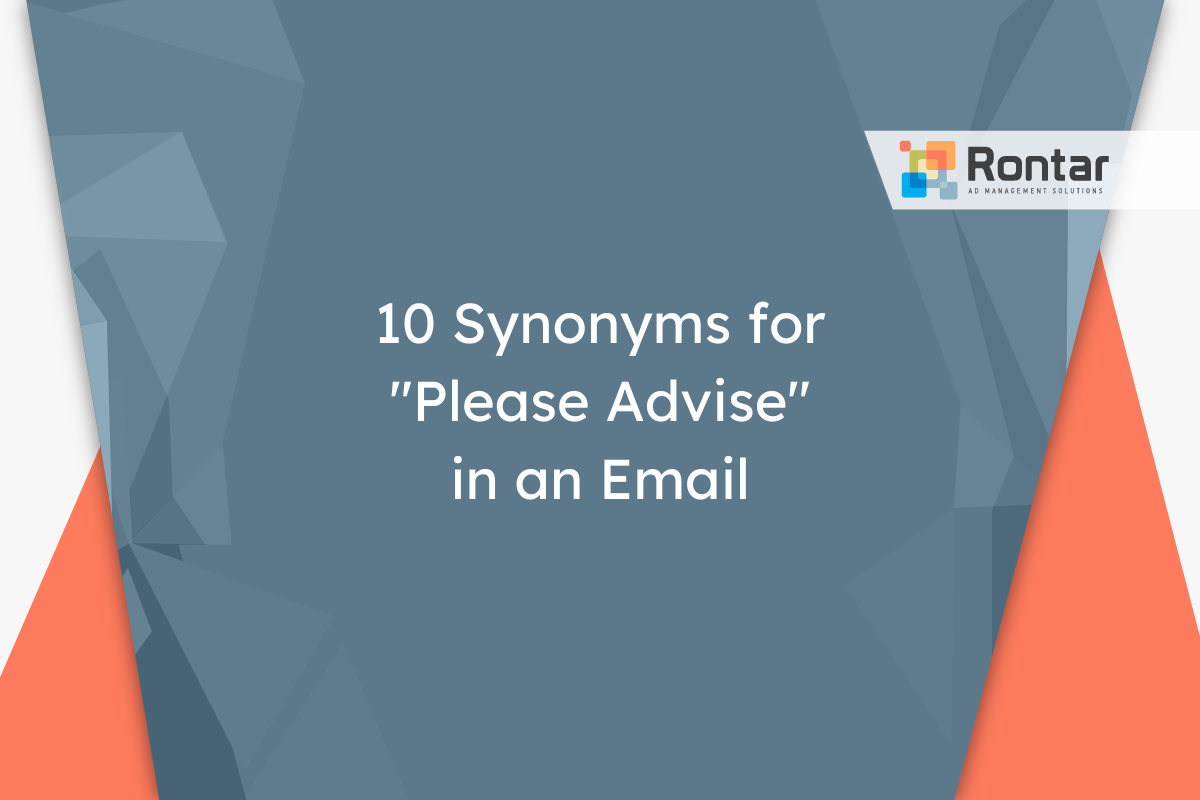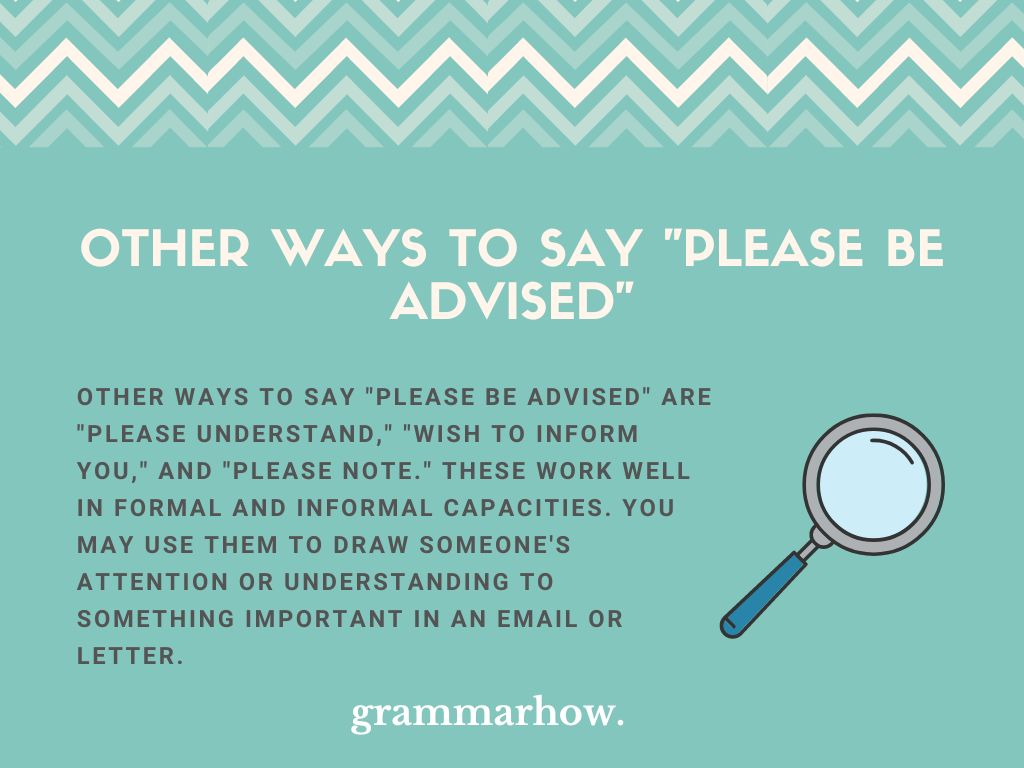When you send an email, the words you choose matter. Using “Please be advised” can sound formal or even a bit stiff, and it might not always fit the tone you want.
If you want to keep your messages clear and professional, but also fresh and engaging, finding the right alternative is key. You’ll discover simple and effective ways to say “Please be advised” that will make your emails stand out and connect better with your readers.
Keep reading to learn how to improve your email communication with just a few word changes.
Common Alternatives To Please Be Advised
Emails often need a polite way to share important information. “Please be advised” is common but can sound formal or stiff. Using alternatives keeps emails fresh and clear. These phrases help you inform without sounding too strict or cold. Choose words that fit your style and message. Here are some common alternatives that work well in emails.
Using Kindly Note
“Kindly note” is polite and soft. It asks the reader to pay attention gently. This phrase fits well in business or casual emails. It shows respect without sounding too formal. Use it to highlight key points clearly.
Employing Please Note
“Please note” is simple and direct. It tells the reader to focus on important details. This phrase is easy to understand for many readers. It fits well in instructions or updates. Use it to keep your message clear and polite.
Trying For Your Information
“For your information” shares facts or updates. It sounds neutral and friendly. Use it to give data or news without pressure. This phrase works great for sharing details or reminders. It keeps the tone light and helpful.

Credit: othervize.com
Formal Alternatives For Professional Emails
Formal alternatives for professional emails help keep your message clear and respectful. They show politeness and professionalism without sounding too casual. Using the right phrases can make your email more effective and easy to follow. Here are some formal ways to say “Please be advised” in emails.
Using We Would Like To Inform
Start your email with “We would like to inform” to share important news. This phrase sounds polite and official. It works well when delivering updates or announcements. It prepares the reader to pay close attention to the details that follow.
Employing This Is To Inform You
“This is to inform you” is a direct and formal way to state facts. It fits well in emails that need clear communication. Use it to highlight important information or changes. It sets a serious tone without being too harsh.
Trying For Your Attention
“Trying for your attention” gently asks the reader to focus on the message. It signals the importance of the content. Use this phrase to make sure the reader notices key points. It shows respect for their time and attention.
Casual Alternatives For Friendly Tone
Choosing a friendly tone in emails helps build good relationships. Casual phrases make messages feel warmer and less formal. They create a sense of ease and approachability. Using simple, clear alternatives to “Please be advised” can improve communication. Here are some easy options to try.
Using Just A Heads Up
“Just a heads up” is great for informal emails. It signals important information without sounding strict. It feels like a gentle warning or reminder. This phrase works well for quick updates or small alerts. It keeps the tone light and friendly.
Employing Wanted To Let You Know
“Wanted to let you know” sounds personal and thoughtful. It shows you care about sharing news or facts. This phrase fits well in casual or semi-formal emails. It invites the reader to pay attention softly. It avoids sounding too direct or harsh.
Trying Fyi
“FYI” stands for “For Your Information.” It is short and easy to use. This abbreviation suits informal emails among colleagues or friends. It delivers facts without extra formality. Use “FYI” to keep emails clear and to the point.

Credit: www.rontar.com
Contextual Usage Tips
Using the right phrase in an email is key to clear communication. Context changes how you say things. This is true for phrases like “Please be advised.” Understanding when and how to use these alternatives helps your message sound natural and respectful.
Here are some tips to help you choose the best phrase for your email’s tone and audience.
When To Use Formal Vs Casual
Formal phrases fit business or official emails. Use them with clients, managers, or people you don’t know well.
Casual phrases work in friendly or team emails. Use them with coworkers or people you know well. This keeps your message warm and clear.
Matching Tone To Audience
Think about who reads your email. Use polite and clear words for serious topics. For simple updates, softer phrases work better.
Adjust your language to fit the reader’s role and your relationship with them. This helps your message connect better.
Avoiding Overuse
Using “Please be advised” too much sounds repetitive. Change your wording to keep emails fresh and interesting.
Mix in other phrases like “Kindly note” or “Just a heads-up” to keep your style varied. This prevents your emails from feeling dull.
Common Mistakes To Avoid
Using “Please be advised” in emails is common, but mistakes can confuse readers. Avoid errors that make your message unclear or too formal. Clear and simple language works best. Watch out for these common mistakes.
Overly Complex Phrases
Some writers use long, complicated phrases instead of simple ones. This can confuse the reader. Instead of “Kindly be advised,” try “Please note.” Keep your language easy to understand. Complex words slow down reading and reduce clarity.
Tone Mismatch
Match your tone with the email’s purpose. “Please be advised” sounds formal and serious. Avoid using it in casual or friendly emails. Using formal phrases in informal messages feels awkward. Choose phrases that fit the situation and your relationship with the reader.
Redundancy Issues
Repeating the same idea wastes space and annoys readers. Saying “Please be advised and take note” adds no extra meaning. Choose one clear phrase to avoid redundancy. Short, direct sentences keep emails sharp and effective.

Credit: grammarhow.com
Frequently Asked Questions
What Are Alternative Phrases For “please Be Advised”?
You can use phrases like “Kindly note,” “For your information,” or “Please be informed. ” These alternatives maintain professionalism and clarity in emails.
How To Politely Say “please Be Advised” In Emails?
Try using “Just a heads-up,” “Please take note,” or “For your awareness. ” These options sound courteous and keep your message clear.
When Should I Avoid Using “please Be Advised”?
Avoid using it in casual or friendly emails. It may sound too formal or stiff in informal communication.
Can I Use “please Be Advised” For Urgent Messages?
Yes, but consider clearer phrases like “Urgent update” or “Immediate attention needed” to highlight urgency better.
Conclusion
Choosing the right phrase can make your email clearer. Simple words help readers understand your message fast. Try different options to fit your tone and purpose. This shows respect and keeps communication smooth. Practice using these alternatives to sound polite and professional.
Clear emails build better connections with your audience. Keep your language easy and direct for best results. Small changes can improve how your message is received. Write emails that feel natural and easy to read.
